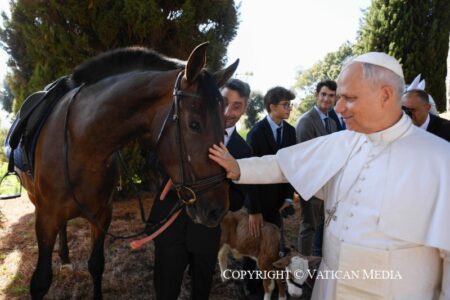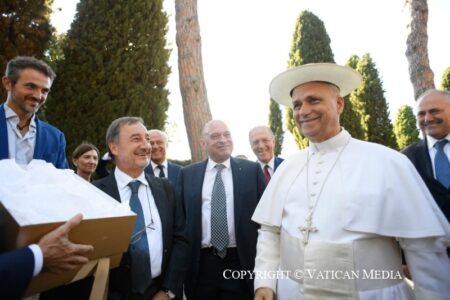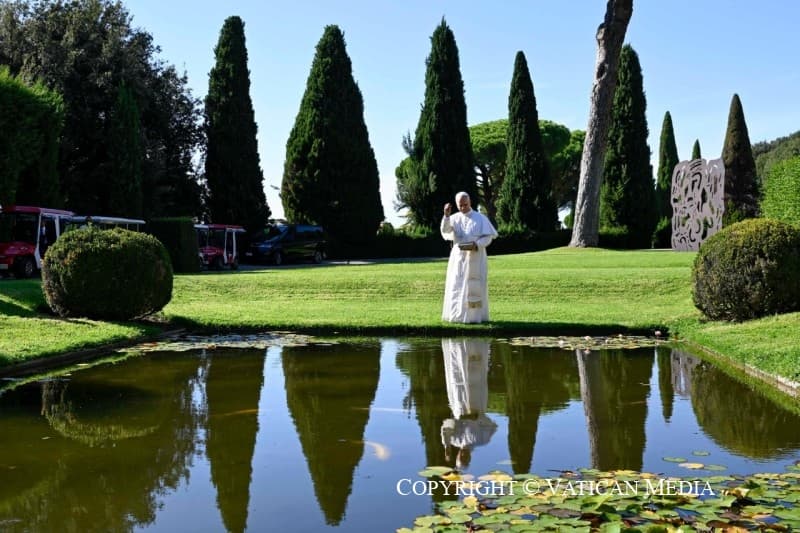
ROME – Pope Leo XIV inaugurated a new Vatican environmental project at his summer residence on Friday, aimed at educating in sustainable development and inspired by his predecessor’s 2015 eco-encyclical “Laudato si’”, calling the project “a seed of hope” for a more sustainable future.
The gesture marks a clear sign of continuity between Leo and Pope Francis with regard to the themes of environmental responsibility and care for creation.
In a brief homily for the Sept. 5 inauguration, Pope Leo referred to Jesus’s instruction to his disciples in the Gospels to “Look at the birds of the air… Consider the lilies of the field, how they grow.”
It is common for Jesus in scripture to refer to nature in his teachings, Leo said, saying, “flora and fauna are often prominent features of his parables. But in this case, there is a clear invitation to observe and contemplate creation, actions aimed at understanding the Creator’s original plan.”
All of creation has been specifically designed and ordered by God, he said, saying each creature has an important role to play.
He noted how Jesus, in referring to the birds and the lilies, said that humanity is worth much more, and that if God adorned the birds and the flowers with such beauty, he would do even more for his sons and daughters.
“Almost as if implicitly repeating the story of Genesis, Jesus emphasizes the special place reserved, in the creative act, for the human being: the most beautiful creature, made in the image and likeness of God,” he said.
Leo said this privilege also implies a responsibility on the part of humanity to safeguard creation, the environment and all of its creatures, out of respect for the design of God as creator.
“Care of creation, then, represents a true vocation for every human being, a commitment to be carried out within creation itself, without ever forgetting that we are creatures among creatures, and not creators,” he said.
For this reason, the pope said, quoting Laudato si’, that it is important to recover harmony with creation and “to reflect in our lifestyle and our ideals, to contemplate the creator, who lives among us and in our surroundings.”
“The Borgo Laudato Si, which we inaugurate today, is one of the church’s initiatives aimed at realizing this vocation of being guardians of the work of God: a demanding but beautiful and fascinating task, which constitutes a primary aspect of the Christian experience,” he said.
Pope Leo called the project a “seed of hope” that Pope Francis wanted to leave as part of his legacy, which he hoped would help foster justice and peace in a world marked by inequality.
“It will do so while remaining faithful to its mandate: to be a tangible model of thought, structure and action, capable of fostering ecological conversion through education and catechesis,” Leo said.
He closed calling the project and its activities “a synthesis of extraordinary beauty, where spirituality, nature, history, art, work, and technology coexist in harmony.”
Borgo Laudato si’ is located on the grounds of the papal residence in Castel Gandolfo, roughly an hour outside of Rome. Pope Leo inaugurated the project by presiding over a prayer ceremony that began with scripture reading and a blessing, after which he visited various areas of the project, greeting staff and their families, and petting animals living on the property.
Famed Italian tenor Andrea Bocelli and his son Matteo participated in the event, alongside various partners of the project and representatives of the Roman Curia and its institutions.
An inspiration of Pope Francis, the Borgo Laudato Si spans some 55 hectors of land and features gardens, palaces, monuments and archeological ruins.
The property includes agricultural areas for the cultivation of vineyards and olive trees, as well as areas for animals, including cows, chickens, donkeys, and horses, as well as spaces for training, catering and regenerative farming.
A new “Santuario” complex with classrooms and multifunctional spaces has been built to host visits of groups and offer lessons environmental care and sustainable development. The property also features an educational greenhouse.
Initial training courses for the Borgo Laudato Si project began in recent months, b

eing offered to “vulnerable groups” such as refugees, women who are victims of violence, former prisoners, and the unemployed.
Italian Cardinal Fabio Baggio, undersecretary of the Vatican Dicastery for Integral Human Development, said in a Sept. 5 press release for the inauguration that by establishing the project in 2023, Pope Francis wanted “a place where care for creation and respect for human dignity, especially the most vulnerable, could be enhanced through a shared commitment rooted in faith.”
Father Manuel Dorantes, administrative director of Borgo Laudato Si, said it is a space with zero environmental impact and was designed to welcome and support people from all ages and walks of life, but especially the most vulnerable.
“It will allow anyone who wishes – including students, managers from companies around the world, and members of the religious community – to live a unique experience of faith that intertwines spirituality, education, and sustainability,” he said.
Borgo Laudato Si’s activities and projects are financed through various collaborations and partnerships with private companies and individuals, with the aim of promoting economic sustainability.
So far, the Borgo Laudato Si has received support from companies such as Italian bank Intesa Sanpaolo, Deloitte, Green Hopes 4.0, Chicago-based company Smith and Stefani LLC, the University of Udine, the University of Notre Dame, as well as the World Business Council for Sustainable Development.
Follow Elise Ann Allen on X: @eliseannallen














